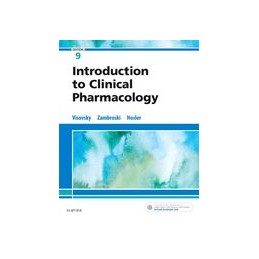- Obniżka


 Dostawa
Dostawa
Wybierz Paczkomat Inpost, Orlen Paczkę, DHL, DPD, Pocztę, email (dla ebooków). Kliknij po więcej
 Płatność
Płatność
Zapłać szybkim przelewem, kartą płatniczą lub za pobraniem. Kliknij po więcej szczegółów
 Zwroty
Zwroty
Jeżeli jesteś konsumentem możesz zwrócić towar w ciągu 14 dni*. Kliknij po więcej szczegółów
Emphasizing safe and effective drug administration, Introduction to Clinical Pharmacology, 9th Edition helps you understand the principles of pharmacology to avoid making medication errors. It promotes safety by showing how drugs and drug classes work, so you can understand why drugs are given, as well as the adverse effects and drug interactions that may occur. This new edition includes Lifespan Considerations which explain important alerts you need to be aware of when administering drugs to pediatric and geriatric patients. The 9th edition also includes a nursing process section which outlines each drug class along with the nurses role during administration. Written by a new team of nationally known nursing educators, this text provides just the right scope of nursing pharmacology content for most LPN/LVN programs.
Opis
Unit I: General Principles
1. Pharmacology and the Nursing Process in LPN Practice 2. Legal, Regulatory, and Ethical Aspects of Drug Administration 3. Principles of Pharmacology
Unit II: Principle of Drug Administration
4. Drug Calculation: Preparing and Giving Drugs
Unit III: Drug Categories
5. Anti-infective Drugs: Antibiotics, Antitubercular Drugs, Antifungals, Antiparasitics 6. Antivirals and Antiretrovirals 7. Drugs for Allergy and Respiratory Problems 8. Drugs Affecting the Renal/Urinary and Cardiovascular Systems 9. Drugs Affecting the Central Nervous System 10. Drugs Affecting the Peripheral Nervous System 11. Drugs for Pain Management 12. Anti-inflammatory, Anti-arthritis, and Antigout Drugs 13. Drugs for Gastrointestinal Problems 14. Drugs Affecting the Hematologic System 15. Immunomodulating Drugs 16. Drugs Affecting the Endocrine System 17. Drugs for Diabetes Management 18. Drugs for Ear and Eye Problems 19. Over-the-Counter Drugs, Herbal and Alternative Drugs, and Vitamins and Minerals
